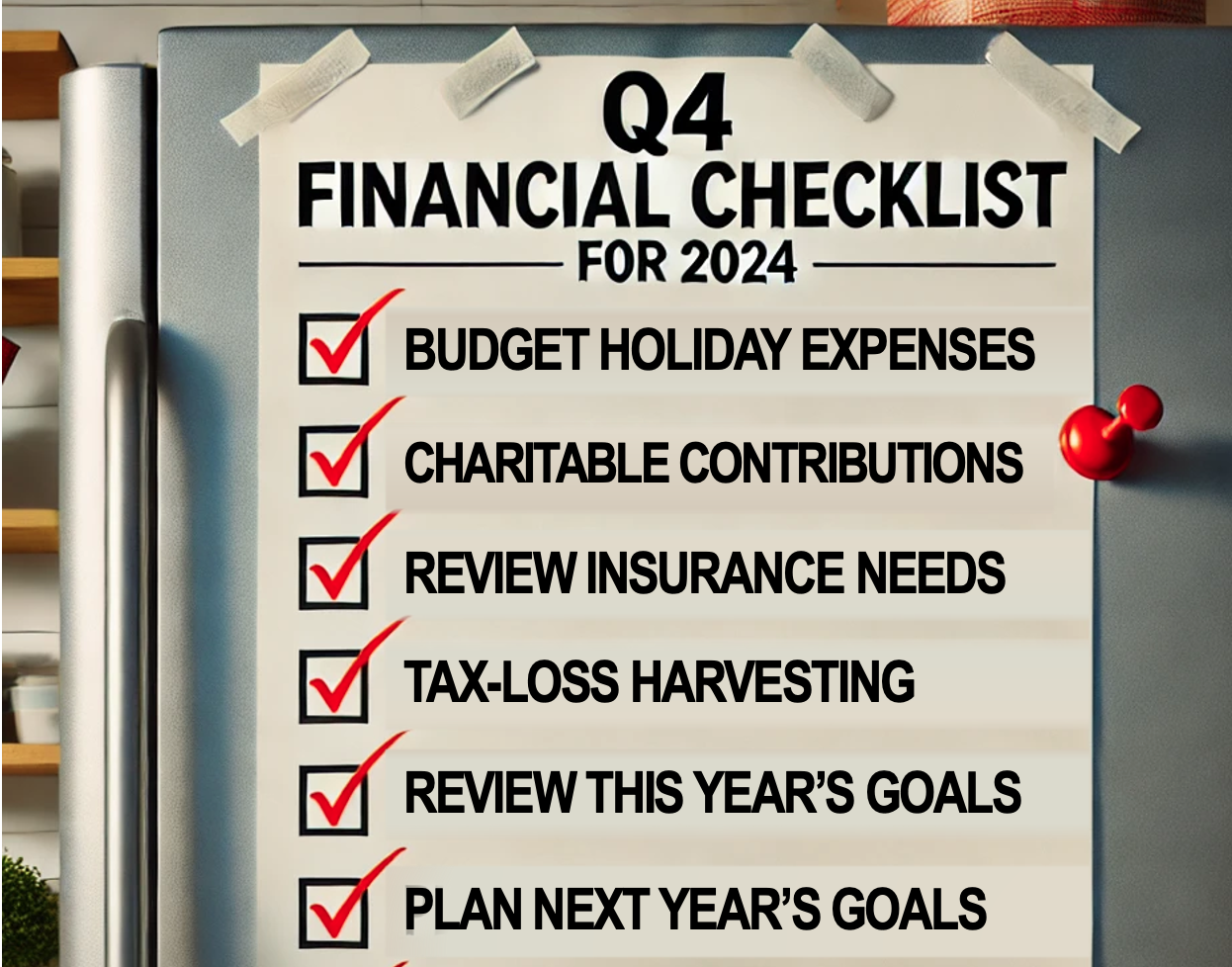As we enter the fourth and final quarter of the year, it’s time once again to talk about checklists. Because if there’s any time to use them, it’s now! After all, …
Now, we apologize for putting Christmas music into your head when we’re still a couple of months away. But we do it to make a point: Checklists are so important, even Santa Claus uses them! And if they’re good enough for Kris Kringle, they’re good enough for us.
As the year winds down, there are many things we can do to strengthen our finances and move closer to our long-term goals. So, to help you close out 2024 with a flourish and build momentum to next year, we’ve created a short “Q4 Financial Checklist.” It contains five tasks to accomplish before the end of the year.
Now, don’t worry! None of these items are difficult. One or two may not even apply to you; others you may have done already. But if you put them all together, we think you’ll find they will go a long way to making your finances — and your holidays — just a little merrier and brighter.
As always, please let us know if you need help or have questions about any of these. In the meantime, we wish you a great fourth quarter!
Q4 Financial Checklist for 2024
Tip: Print this out and stick it on the fridge or somewhere else it will be seen. That way, you can check off the items one by one as you complete them!
– – – – – – – – – – – – – – –
- Budget your holiday expenses
The upcoming holiday season is a great boost for morale as the days get shorter and the weather gets colder. But they can also be a huge drain on our wallets. In fact, the average consumer spends $1,650 to celebrate the winter holidays!1 From presents to food to decorations, holiday expenses can pile up quickly, eat into savings, and even cause people to take on more debt. But all of that can be avoided with just a little planning.
Take time to budget exactly how much you want to spend on each holiday by determining what your needs will be well in advance. Begin by looking at last year’s spending to figure out if there are ways to save or cut back. Next, start determining how many people are coming to Thanksgiving dinner. And be sure to check that one box in the garage before buying yet another set of holiday lights. You get the idea. Then, decide exactly how you’ll pay for each holiday expense. Will you pull money from savings? Use a credit card? From there, you can set a specific spending limit for each expense, keeping costs down while also spending more on the things you truly care about around the holidays.
- Review your insurance needs
November is Open Enrollment season in the U.S. That means it’s a good time to review your current insurance coverage and examine if you have any gaps in coverage that need to be filled or if there are less expensive alternatives out there. For those nearing retirement, this is also an opportunity to look at additional types of coverage beyond standard health insurance, like Disability and Long-Term Care Insurance.
- Check for opportunities to harvest your tax losses
As we approach the end of the year, it’s wise to look back and see all the ups and downs we experienced in the markets this year — and the ups and downs you’ve probably experienced in your portfolio. As you know, when you sell an investment that has increased in value, you must pay taxes on your capital gains. But when you sell an investment that has decreased, you can declare a capital loss. A loss can often be used to offset the taxes you pay on your capital gains, thus reducing your overall tax bill. This is known as tax-loss harvesting, and when done accurately and consistently, it can increase your after-tax returns by 1%.2 Over time, this can make a big difference! So, as the year winds down, take time to review your outside investments for opportunities to harvest your tax losses. As always, let us know if you need any help.
- Consider your charitable contributions
These days, more and more people are starting to think of investing not just as a way to help themselves, but to help their communities. That’s especially true around the holiday season. But charity isn’t just about giving back. It can bring tax benefits, too! In fact, there are several charitable gifting strategies that investors can take advantage of. But it’s important to start thinking about this sooner rather than later if you want to be savvy about it. A few things for you to consider:
1) Have you maxed out your charitable donations for the year?
2) Are you planning on contributing cash, stock, or other assets?
3) Can you take advantage of a Qualified Charitable Distribution (QCD)?
If you have any questions about this or need help game-planning your own charitable contributions, please let us know. We would be happy to help.
- Review this year’s goals and plan for next year’s
It’s crazy to think that we’re only one quarter away from a new calendar year! Because 2025 is just around the corner, now is the time to review how you’ve progressed on your goals this year so you can accurately plan for what needs to be done next year. What goals are you behind on at that need to be reprioritized? What new goals do you have? By doing this now, you can finish 2024 strong and start 2025 hot out of the gate.






